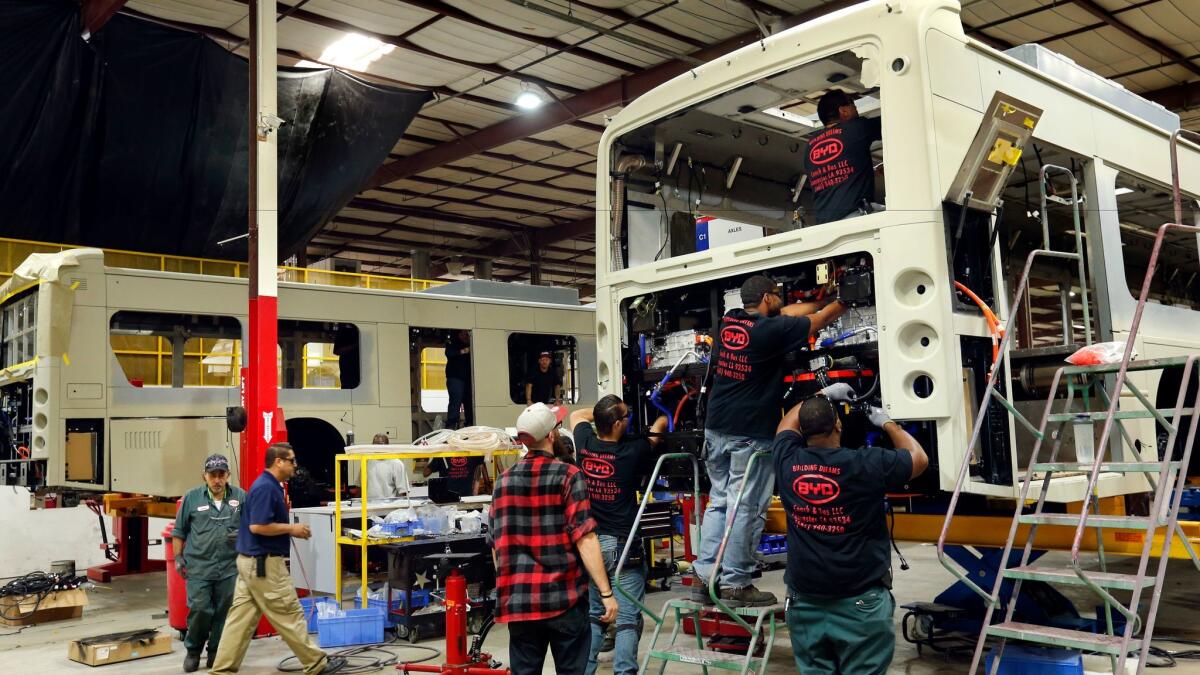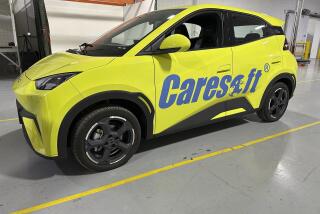Editorial: Anti-China push in D.C. could cost 800 workers their jobs in Los Angeles County

Anti-China fervor is gripping Washington, D.C., these days, and the collateral damage could be 800 mostly union jobs at the BYD electric bus factory in the high desert city of Lancaster.
Thatâs because Congress is considering banning the use of federal transportation dollars to buy buses or rail cars made by companies owned or subsidized by the Chinese government. The proposal is included in the defense spending bill for the fiscal year that starts Oct. 1. The House version would only apply to rail cars; the Senate version would bar rail cars and buses. The White House, already waging a trade war against China, wants the ban to apply to both.
The ban could put two major manufacturers out of business in the United States: Build Your Dreams (BYD), a private Chinese company that sells electric buses, and CRRC Corp., a Chinese state-owned maker of passenger rail cars.
Over the last few years, BYD and CRRC have gained a foothold in the U.S. market, winning contracts to sell buses and rail cars to cities across the country. CRRC has opened plants in Massachusetts and Illinois to assemble subway and light rail cars for Boston, Los Angeles and Chicago transit agencies.
BYD, which makes about one-third of the electric buses currently operating in the U.S., opened its plant in Lancaster in 2013. After some early fights with BYD over hiring and wage promises, labor advocates say the company has become a âmodel employer,â offering high-paying union jobs and corporate investment in a community that has struggled with unemployment.
So thereâs considerable fear and frustration that Congress and President Trump would sacrifice coveted American jobs to placate anxieties about Chinaâs economic ambitions. And worse, theyâd do it on specious grounds.
Advocates for the ban claim CRRC and BYD pose a national security risk. Chinese companies, they assert, could embed cameras, location trackers and other technology into buses and trains that would allow the Chinese government to spy on Americans or sabotage U.S. transportation infrastructure.
Yes, lawmakers should be thinking about cyber security and the threats posed by Chinese companies under the thumb of an authoritarian and often adversarial regime. Yet how are trains and buses, which are built to public agenciesâ specifications, assembled on U.S. soil and inspected on a regular basis, more of an espionage threat than, say, the Chinese-assembled security cameras, phones, routers, computers and appliances in American homes and offices? Theyâre not, of course. But itâs easier for Congress to cut off federal funding to public transit than it is to vet the vast number of products imported from China.
Protectionism appears to be the real impetus behind the proposed ban.
Proponents argue that Chinese companies get government support that allows them to underbid for public transit contracts, push out other manufacturers and eventually control the market and raise prices. But there are no American-owned passenger rail car manufacturers, so Congress would just be protecting Canadian, Korean and other foreign manufacturers â all of which have to play by the same âBuy Americaâ rules as CRRC that require rail cars be built with a certain amount of domestic materials and assembled in the U.S. Those rules, by the way, are themselves protectionist, designed to preserve jobs and capital investment in this country; isnât one layer of protectionism enough?
There are two American-owned companies that build freight rail cars, and they have been leading the push for the ban lest Chinese companies try to parley their expertise in the people-moving industry into profits in the goods-moving one. Yet it seems premature to pass anti-competitive legislative that will wipe out existing jobs over fears that maybe, someday, a Chinese company will try to enter another market.
There is also no evidence that BYD has been low-balling bids to squeeze out competition. In fact, the market for electric buses is expected to grow exponentially because transit agencies in California have to start buying zero-emission vehicles over the next decade. Taking out BYD will diminish competition and make it more expensive for cash-strapped transit agencies to comply with the stateâs environmental mandates.
We understand the anxiety that U.S.-owned businesses have about competing with companies that donât play by the same economic rules as they do. Thatâs why itâs crucial for transit agencies to scrutinize bids from Chinese companies to make sure the playing field is truly level. At the end of the day, though, where a bidderâs headquarters is located matters less to a community than where that company will be investing, hiring and buying.
The proposed restrictions on rail cars and buses threatens the livelihood of hundreds of American workers, along with those of the families they support and businesses they patronize. Their paychecks may be signed by a Chinese company, but the benefits of their work accrue in the U.S.
More to Read
A cure for the common opinion
Get thought-provoking perspectives with our weekly newsletter.
You may occasionally receive promotional content from the Los Angeles Times.










